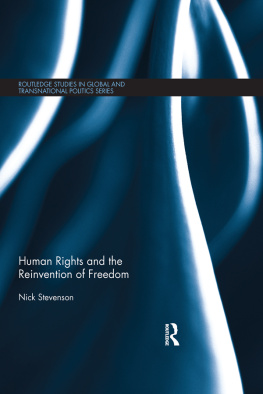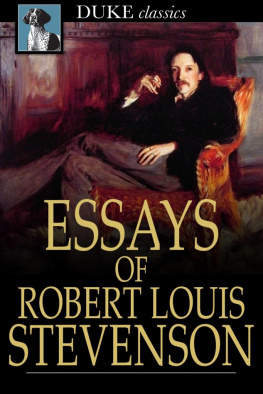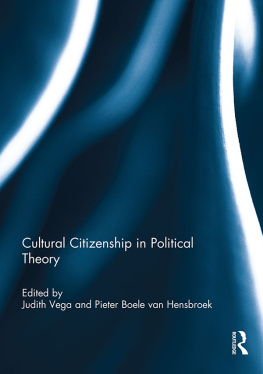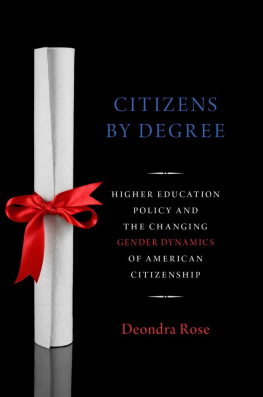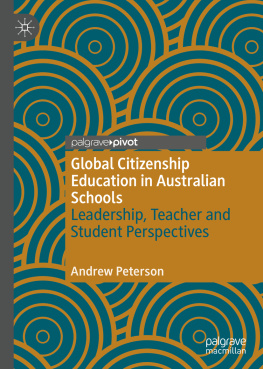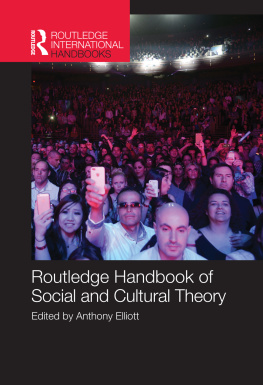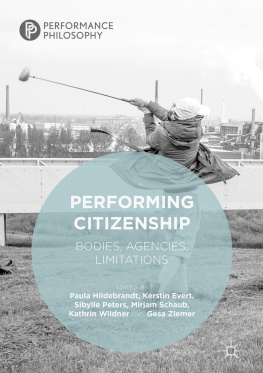Education and Cultural Citizenship
Nick Stevenson
Theory, Culture & Society
Theory, Culture & Society caters for the resurgence of interest in culture within contemporary social science and the humanities. Building on the heritage of classical social theory, the book series examines ways in which this tradition has been reshaped by a new generation of theorists. It also publishes theoretically informed analyses of everyday life, popular culture and new intellectual movements.
EDITOR: Mike Featherstone, Nottingham Trent University
SERIES EDITORIAL BOARD
Roy Boyne, University of Durham
Mike Featherstone, Nottingham Trent University
Nicholas Gane, University of York
Scott Lash, Goldsmiths College, University of London
Roland Robertson, University of Aberdeen
Couze Venn, Nottingham Trent University
THE TCS CENTRE
The Theory, Culture & Society book series, the journals Theory, Culture & Society and Body & Society, and related conference, seminar and postgraduate programmes operate from the TCS Centre at Nottingham Trent University. For further details of the TCS Centres activities please contact:
The TCS Centre
School of Arts and Humanities
Nottingham Trent University
Clifton Lane, Nottingham NG11 8NS, UK
email:
web: http://sagepub.net/tcs/
Recent volumes include:
Inhuman Nature
Nigel Clark
The Domestic Economy of the Soul
John ONeill
Race, Sport and Politics
Ben Carrington
Intensive Culture
Scott Lash
Peer to Peer and the Music Industry
Matthew David
Nick Stevenson skilfully draws upon a welter of leading thinkers from the liberal, socialist, critical-theory and multiculturalist canons in developing his argument that leading ideas about education are umbilically tied to notions of the good society. The pluralistic and un-dogmatic manner in which he sifts these accounts, and his insistence upon the centrality of democratic citizenship, make this a timely and important contribution to current debates about the nature and purpose of schools.
Michael Kenny, Professor, Department of Politics, University of Sheffield
In Education and Cultural Citizenship Nick Stevenson presents a powerful argument concerning how education can and should promote democracy, accompanied by critiques of how all-too-often education fails to do so. Full of strong ideas, arguments, engagement with key thinkers, Stevensons book should be of great interest to all concerned with the nexus of democracy and education.
Douglas Kellner, UCLA, author of Guys and Guns Amok and Media Spectacle and the Crisis of Democracy
2011 Nick Stevenson
First published 2011
Apart from any fair dealing for the purposes of research or private study, or criticism or review, as permitted under the Copyright, Designs and Patents Act, 1988, this publication may be reproduced, stored or transmitted in any form, or by any means, only with the prior permission in writing of the publishers, or in the case of reprographic reproduction, in accordance with the terms of licences issued by the Copyright Licensing Agency. Enquiries concerning reproduction outside those terms should be sent to the publishers.
SAGE Publications Ltd
1 Olivers Yard
55 City Road
London EC1Y 1SP
SAGE Publications Inc.
2455 Teller Road
Thousand Oaks, California 91320
SAGE Publications India Pvt Ltd
B 1/I 1 Mohan Cooperative Industrial Area
Mathura Road, Post Bag 7
New Delhi 110 044
SAGE Publications Asia-Pacific Pte Ltd
33 Pekin Street #02-01
Far East Square
Singapore 048763
Library of Congress Control Number: 2010939199
British Library Cataloguing in Publication data
A catalogue record for this book is available from the British Library
ISBN 978-1-84860-646-3
ISBN 978-1-84860-647-0 (pbk)
Typeset by C&M Digitals (P) Ltd, Chennai, India
Printed by CPI Antony Rowe, Chippenham, Wiltshire
Printed on paper from sustainable resources
For Alastair Stevenson, Ida James, Eve James,
Joseph Hurd and Charlotte Hurd
About the Author
Nick Stevenson is a Reader in Cultural Sociology, University of Nottingham. His most recent books include David Bowie (2006, Polity Press), Cultural Citizenship (2003, OUP), Culture and Citizenship (2001, Sage), Understanding Media Cultures (2001, Sage) Making Sense of Mens Lifestyle Magazines (written with Peter Jackson and Kate Brooks) (Polity, 2000) and The Transformation of the Media (1999, Longman). He is currently writing a short book on freedom for Routledge.
Acknowledgements
I would like to thank many of the people who have helped with the production of this book in particular my partner Lucy James, whose faith, love and encouragement have been crucial when my sense of purpose has started to flag.
I would also like to thank Nottingham University for having such a good education library. This was always a pleasant place to work, and I spent many a happy afternoon there. Further, my publishers SAGE (especially Chris Rojek and Jai Seaman) have been excellent as usual.
Most books have a connection to the personal life of the author and this one is no different. Without the ties to my own and my sister Janes children I doubt I would ever have written on this topic. I have followed their first steps into the world with great interest and it has become clear just how significant an influence education is on the shaping of our identities. This has also led me to rethink my own education and I would like to thank all of them for sharing with me many of their experiences. This book is dedicated to them.
During the writing of this book both of my parents Dermis and June and Lucys father Maurice died. I would like to thank all of the people who helped me during this period. Your parents are of course your first and most important educators and I would like to remember them here. Not a day goes by when they are not missed or their considerable influence is not noted.
I would also like to thank my education policy advisors Mark Bevan, Toby Greaney, Matt Varley and Stewart Philpott for keeping me up to speed with current developments in education and their personal and professional lives. I can only hope they are not too horrified by the arguments contained within this book. Thanks too to Diane Beechcroft, David Rose and Colin Lago who offered a different kind of education.
In a more academic and professional context I have learned a great deal from the conversations of Anthony Elliott, Angharad Beckett, Stella Hart, Jagdish Patel, John Downey, Jim McGuigan, David Moore, David Hesmondhaugh, Paul Ransome, Nick Couldry, Robert Unwin, Maurice Roche and numerous colleagues in the school of Sociology and Social Policy. Here I especially want to thank the anonymous reader and Professor Mike Kenny for their critical and incisive comments.
Finally I would like to thank my thoughtful teachers Mr Dome, Mr Sawford, Miss Stevens, Paul Bellaby, John Bowen, Steven Webb and Anthony Giddens for their wise guidance in years gone by.




